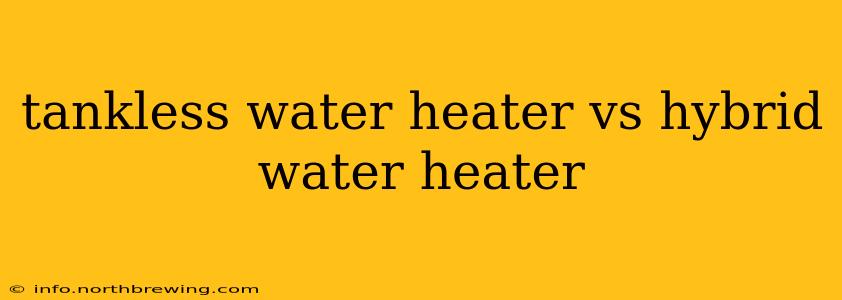Choosing the right water heater can significantly impact your comfort, energy bills, and overall home efficiency. Two popular options vying for top spot are tankless and hybrid water heaters. Both offer advantages over traditional tank water heaters, but understanding their differences is crucial to making an informed decision. This comprehensive guide will delve into the key distinctions, helping you determine which system best suits your needs and lifestyle.
What is a Tankless Water Heater?
Tankless water heaters, also known as on-demand water heaters, heat water directly without storing it in a tank. When a hot water tap is turned on, cold water flows through the unit, where a heating element rapidly heats it to the desired temperature. This eliminates standby heat loss, a major source of inefficiency in traditional tank systems.
Advantages of Tankless Water Heaters:
- Unlimited Hot Water: Unlike tank water heaters with limited capacity, tankless systems provide a virtually endless supply of hot water. Perfect for large families or homes with multiple showers or fixtures.
- Energy Efficiency: By only heating water when needed, tankless heaters significantly reduce energy consumption compared to tank-style heaters.
- Longer Lifespan: With fewer moving parts and no tank to corrode, tankless water heaters typically boast a longer lifespan (15-20 years or more).
- Space Saving: Their compact size makes them ideal for smaller spaces or areas where a bulky tank would be inconvenient.
Disadvantages of Tankless Water Heaters:
- Higher Upfront Cost: The initial investment for a tankless system is generally higher than for a comparable tank water heater.
- Potential for Lower Flow Rates: Very high-flow demands might exceed the capacity of some tankless models, leading to fluctuating water temperatures.
- Installation Complexity: Installation can be more complex than for tank water heaters, often requiring specialized plumbing and venting.
- Maintenance Requirements: Regular maintenance, including descaling, is essential to ensure optimal performance and lifespan.
What is a Hybrid Water Heater?
Hybrid water heaters, also called heat pump water heaters, combine a heat pump with a supplemental electric heating element. The heat pump extracts heat from the surrounding air and transfers it to the water in the tank, making them highly energy-efficient. The electric element acts as a backup when the heat pump can't meet the hot water demand.
Advantages of Hybrid Water Heaters:
- High Energy Efficiency: Hybrids are significantly more energy-efficient than traditional electric tank water heaters, often achieving Energy Factor (EF) ratings exceeding 3.0.
- Lower Operating Costs: The superior energy efficiency translates to lower operating costs over the lifespan of the unit.
- Good for Moderate Hot Water Use: They are a good choice for families with moderate hot water needs.
- Relatively Quieter Operation: Hybrid systems tend to operate more quietly than many tankless systems.
Disadvantages of Hybrid Water Heaters:
- Larger Footprint: They require more space than tankless systems due to the presence of a storage tank.
- Lower Flow Rate compared to Tankless: The hot water output rate is slower than a tankless system, especially during peak demand times.
- Ambient Temperature Dependent: Efficiency decreases in extremely cold climates. They may require supplemental heat more often in colder temperatures.
- Higher upfront cost than traditional tank heaters, but often less than tankless.
How Much Does a Tankless Water Heater Cost?
The cost of a tankless water heater varies significantly based on factors like size, features, and brand. Expect to pay anywhere from several hundred to over a thousand dollars.
How Much Does a Hybrid Water Heater Cost?
Similar to tankless systems, hybrid water heater costs vary widely. Generally, expect to pay more than a standard electric tank water heater, but less than a comparable tankless unit.
Which Water Heater is Better for a Large Family?
For a large family with consistently high hot water demands, a tankless water heater might be the better option due to its virtually unlimited hot water supply. However, ensure the unit's flow rate matches your family's needs.
Which Water Heater is More Energy Efficient?
Both tankless and hybrid water heaters offer superior energy efficiency compared to traditional tank water heaters. However, the most energy-efficient choice depends on your specific climate and hot water usage patterns. In milder climates, a hybrid water heater often proves more efficient. In colder climates, the efficiency of a heat pump can decline, making a tankless unit a more reliable option (but this may require higher energy usage than a hybrid in milder climates).
Which Water Heater is Best for Cold Climates?
In extremely cold climates, a tankless water heater is generally more reliable since its efficiency isn't as heavily impacted by ambient air temperature as a hybrid heat pump water heater.
Which Water Heater Lasts Longer?
Generally, tankless water heaters have a longer lifespan (15-20 years or more) than hybrid water heaters (around 10-15 years) and traditional tank water heaters (8-12 years), although proper maintenance is essential for all types.
Conclusion
The optimal choice between a tankless and hybrid water heater depends heavily on individual needs and circumstances. Consider factors such as family size, hot water usage patterns, climate, budget, and available space to make the best decision. Consulting with a qualified plumber or HVAC technician is recommended to assess your specific requirements and determine the most suitable system for your home.
